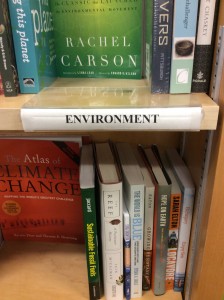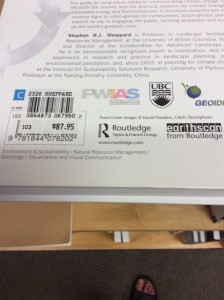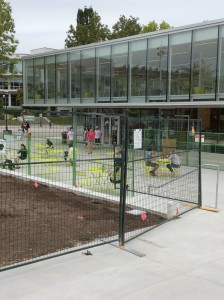I am sitting in the social space above the new MEC outlet in the former UBC store, of course still runs as the bookstore, but what I seen so far makes me wonder how much longer it will sell books. Seems like a simple mission today: find a selection of textbooks on environmental science. However there is a new system where you enter your student ID and a list of books will be printed up for you. All books are now arranged alphabetically by their author rather then grouped by subjects making it harder to find something like environmental science textbooks. Some of the staff members told me that since there are not many ES students enrolled during summer, the selection is limited but they had a shelf or two of related books. Here is what I found:
Classics like Rachel Carson’s Silent Spring, some books by David Suzuki and other reliable authors writing on oil, water etc. etc. even an atlas on climate change (seems so 2004). I was very curious to see where today’s reading would have fit in with these authentic please to change the world. What did find was a $87 textbook that resembled the one I had read as a PDF file. Now I am really wondering who buys this type of text? I’m sure the environmental science courses are still popular from September until April, but the information presented in that chapter of the PDF file really lost my interest. I can’t claim to be an expert on the damages been done to the planet, nor the economic impasse any attempt to fix these problems will create, but what I hope would be a healthy interest in the complexity of these problems met with utter confusion trying to understand who benefits from buying a book that features bogus quotes by Albert Einstein and other misleading investigations of transdisciplinarity look more like attempts to occlude information rather than help bright minds figure out the intricate connections between human activity and environmental impact.
It could be easy to blog about the possible conspiracy theory, thinking not such a textbook makes it easier for climate change deniers to denounce any latest development. But still, someone must be purchasing these textbooks for their classes or just out of general interest. “Transdisciplinarity processes can also have an impact on changing the real world. We can consider it as a method for organizing sustainability learning in the abstract and the concrete.” (p. 27) – really, did that happen in the last couple of pages? No, seriously, am I missing something that is obvious to someone else in another discipline? When I finished my masters program, one of my classmate half-jokingly suggested that we write a text for educational technology. Our only goal was to make a pile of money on a subject with lots of tracking but no authorial voice to tell the uninitiated what to study. Of course it was simply to get rich quick with our newly minted degrees. Now I feel like being cynic in academia, barking out a scathing blog post of a textbook I didn’t agree with, but I can’t be the first person to read such a chapter and wonder what was I supposed to have learned reading this! The fortunate thing in my case is only having to read a PDF but I suspect I am paying for it still in other ways, and the university can now afford an aquatic centre, soon to be constructed within a stone’s throw of my Bookstore social space chair.


